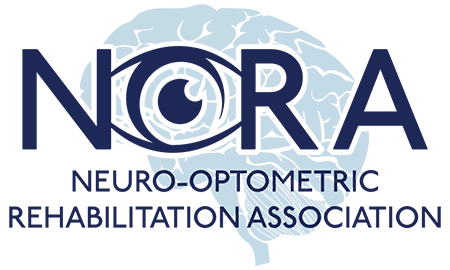What is the difference between Neuro-Optometric Rehabilitation and Vision Therapy?
Are all Optometrists trained in Neuro-Optometric Rehabilitation Therapy?
What is the difference between a Neuro-Optometric Rehabilitation Optometrist and Neuro-Ophthalmologist?
Why do I need to see other rehabilitation specialists if my vision is affected?
How are vision problems found after a Traumatic Brain Injury?
How long does vision rehabilitation last?
What is the difference between Neuro-Optometric Rehabilitation and Vision Therapy?
Neuro-Optometric Rehabilitation is a specialized, individualized treatment regimen for those who have visual deficits as a direct result of physical disabilities, traumatic brain injuries, and other neurological insults. Neuro-Optometric Rehabilitation therapy utilizes therapeutic prisms, lenses, filters and occlusion to help stimulate parts of the brain which are not functioning to their highest potential, due to interruptions caused by the brain injury.
Neuro-Optometric Rehabilitation is not to be confused with vision therapy, which is an additional therapy needed by some brain injury survivors. Vision therapy is a highly effective non-surgical treatment for many common visual problems such as lazy eye, crossed eyes, double vision, convergence insufficiency and some reading and learning disabilities. In the case of learning disabilities, vision therapy is specifically directed toward resolving visual problems which interfere with reading, learning and educational instruction.
Not all doctors who do vision therapy are trained in Neuro-Optometric Rehabilitation.
Are all Optometrists trained in Neuro-Optometric Rehabilitation Therapy?
No. Optometrists trained in Neuro-Optometric Rehabilitation Therapy have continued their education beyond their Doctor of Optometry (O.D.) degree. This continuing education emphasizes the use of lenses, prisms, and vision therapy to enhance a patient's visual capabilities, reduce visual stress, prevent and rehabilitate vision problems. For assistance in locating a Neuro-Optometric Rehabilitation Optometrist in your area, visit our Find a Provider page.
What is the difference between a Neuro-Optometric Rehabilitation Optometrist and Neuro-Ophthalmologist?
Neuro-Optometric Rehabilitation Optometrists specialize in the diagnosis and treatment/rehabilitation of neurological conditions adversely affecting the visual system. Neuro-Optometric Rehabilitation is a process for the rehabilitation of visual, perceptual, and motor disorders. Clinical experience and research studies document the improved performance of patients who have completed a vision rehabilitation program.
Neuro-Ophthalmologists specialize in visual problems that relate to the nervous system. This includes loss of sight due to injury to the brain or the optic nerves which transmits visual signals from the eyes to the brain. Such injury can be caused by trauma, inflammation, strokes, tumors, toxicities and infections.
Why do I need to see other rehabilitation specialists if my vision is affected?
Brain injury can affect a person in many ways. Depending on the extent of the injury, problems with visual information processing may contribute to and/or exacerbate symptoms of things such as eye strain, fatigue, headaches, difficulties with balance and posture, depth perception, and memory loss. Often one type of rehabilitation is not enough to address all of the individual’s needs. An interdisciplinary, integrated team approach can play a vital role in the rehabilitation of patients with concussions, stroke or other neurological deficits.
How are vision problems found after a Traumatic Brain Injury?
Visual problems are often overlooked during initial treatment of a brain injury and in some cases, symptoms may not be present until sometime following the injury (click here to learn about some common vision problems & symptoms following a brain injury). If you notice any changes in your vision following a concussion or some other head trauma, don’t ignore them and immediately contact your eye care professional. Early diagnosis leads to appropriate treatment and/or referral to a specialist, such as a Neuro-Optometric Rehabilitation Optometrist.
How long does vision rehabilitation last?
Some rehabilitation may last weeks or months, while others may last years. Programs and treatments will change as a patient’s particular needs change.
